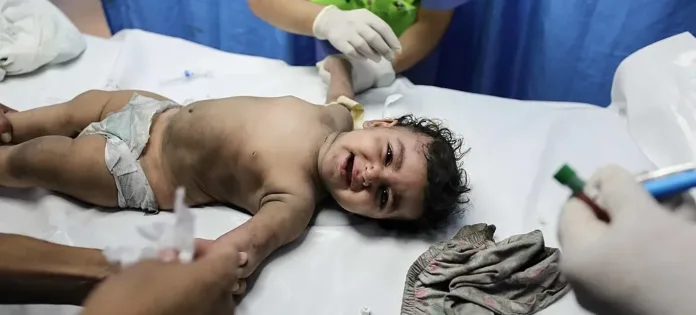Between 30 and 50 Gaza children will be flown to the UK for urgent medical care
A group of critically ill and injured Palestinian children from Gaza will be brought to the United Kingdom for urgent medical treatment in the coming weeks, the BBC understands. It will be the first time children are evacuated to Britain under a government-run scheme since the war began in October 2023.
Between 30 and 50 children are expected to be included in the initial cohort, all of them selected according to medical need by doctors working for Gaza’s health ministry. Their cases will then be processed through the World Health Organisation, which will oversee arrangements for their travel and transfer. The operation is being coordinated by the Foreign Office, Home Office and Department of Health.
The plan comes after mounting political pressure on the government to act. A cross-party group of 96 MPs recently wrote to ministers urging them to bring sick and injured children to Britain “without delay”, warning that many were at risk of imminent death as Gaza’s healthcare system has been “decimated”. Earlier this month, ministers insisted plans were being drawn up “at pace”.
Some children from Gaza have already arrived in the UK for treatment through the charity Project Pure Hope, which has privately arranged evacuations. But this marks the first official government initiative to accept child patients for NHS care. The British scheme will prioritise those in need of highly specialised, lifesaving treatment, with cases assessed through clinical protocols before being referred by local doctors. Approval will then rest with Gaza’s Ministry of Health Referral Committee, after which the WHO will coordinate documentation with potential host countries, seek security clearance from Israel, and arrange transport.
Children cleared for evacuation will be accompanied by relatives, typically one adult and up to three siblings, and will travel via a third country where biometric checks will be carried out before they board flights to Britain. It remains unclear which transit country will be used, how many children will eventually be included, or whether more groups will follow.
Embed from Getty ImagesThe UK has agreed to cover the costs of treatment, housing and living expenses for the children and their carers once they arrive. That includes medical care provided by the NHS, as well as mental health support to help them recover from both their injuries and the trauma of war. Given the extreme difficulties of returning to Gaza, it is understood some of the children may eventually enter the asylum system if ongoing treatment is needed and safe return is impossible.
The humanitarian crisis in Gaza remains severe. UNICEF estimates that more than 50,000 children have been killed or injured since the conflict erupted. The UN has also warned of famine-like conditions, with widespread malnutrition and what aid agencies describe as the “worst-case scenario” playing out across the territory.
The UK has already provided financial support to enable injured Gazans to be treated in neighbouring countries and has coordinated with Jordan to airdrop aid. But until now it had resisted calls to take in patients itself. Ministers now hope the new scheme will offer a lifeline to those most at risk.
Elsewhere in Europe, severely ill Palestinians have already been evacuated to other nations, including more than 180 adults and children to Italy. Britain’s contribution will now add to those international efforts.
The war in Gaza was triggered by the Hamas-led assault on southern Israel on 7 October 2023, which killed around 1,200 people and saw more than 250 hostages taken. Israel’s subsequent military campaign has, according to the Hamas-run health ministry, left more than 60,000 people dead. Israel rejects accusations of genocide but has faced mounting criticism from international human rights organisations over the scale of civilian casualties.
For the children now preparing to leave Gaza, the journey offers a fragile chance of survival. For the UK, it signals a willingness to do more than fund treatment abroad — to bring the youngest victims of war directly into its hospitals.
